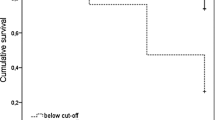Abstract
Background and aims: The early detection and prevention of dementia is attracting attention. We therefore developed an easily performed protocol to identify patients with memory impairment which may progress to dementia, and evaluated its validity. Methods: We focused on short-term memory impairment alone, and named the test, consisting of 3 tasks, the simplified Short-Term Memory recall Test (STMT; with a maximum score of 8). Patients were classified into a memory impairment group of 26 subjects and a control group of 23 subjects. At the first examination, subjects underwent the STMT, MMSE and ADAS-Jcog. as cognitive function tests. Follow-up observations were performed for 2 years at 6-month intervals. Results: There were significant differences in the mean scores for all tests, except for MMSE memory items between the 2 groups. When the cut-off value of STMT was established as 4 points, and scores lower than this value were defined as memory impairment, the sensitivity and specificity were highest, 73.1% and 82.6%, respectively. Sensitivity and specificity also rose to 92.3% and 95.7%, respectively, when STMT scores were added together with those of ADAS-Jcog. Results of logistic regression analysis indicated that development into Alzheimer’s disease 2 years later was significantly correlated with STMT scores at first examination. The incidence of progression to Alzheimer’s disease in patients with scores ≤4 (cut-off value) was about 5 times higher than that of patients with scores ≥5. Conclusions: This study suggests the usefulness of the STMT for identifying memory impairment as a pre-dementia state.
Similar content being viewed by others
References
Ide M, Kobayashi N, Tago H. The present situation of memory loss outpatient departments: University hospitals of local cities. Jpn J Geriatr Psychiatry 2005; 16: 1351–6 (in Japanese).
Kobayashi N, Tago H, Niwa S. Senile mental disorders. In Niwa S, ed. New Age of Psychiatric Treatments Vol. 9, Integration of Pharmacotherapy and Psychosocial Therapy. Tokyo: Nakayama-Shoten, 2003: 205–55 (in Japanese).
Kobayashi N, Tago H, Niwa S. The therapies of senile depression. Jpn J Geriatr Psychiatry 2004; 15: 1263–70 (in Japanese).
Crook T, Bartus R, Ferris SH et al. Age-associated memory impairment; proposed diagnostic criteria and measures of clinical change. Report of National Institute of Mental Health Work Group. Dev Neuropsychol 1986; 2: 161–276.
Petersen RC, Smith GE, Waring SC et al. Mild cognitive impairment: clinical characterization and outcome. Arch Neurol 1999; 56: 303–8.
Katoh S, Shimogaki H, Onodera A et al. Development of the revised version of Hasegawa’s Dementia Scale (HDS-R). Jpn J Geriatr Psychiatry 1991; 2: 1339–47 (in Japanese).
Folstein MF, Folstein SE, McHugh PR. “Mini-mental state”. A practical method for grading the cognitive state of patients for the clinician. J Psychiatr Res 1975; 12: 189–98.
Itoh N, Arai H, Urakami K et al. Large-scale, multicenter study of cerebrospinal fluid tau protein phosphorylated at serine 199 for the antemortem diagnosis of Alzheimer’s disease. Ann Neurol 2001; 50: 150–6.
Bush C, Kozak J, Elmslie T. Screening for cognitive impairment in the elderly. Can Fam Physician 1997; 43: 1763–8.
Japanese Psychogeriatric Society. The Diagnostic and Therapeutic Manual of Alzheimer’s Disease. Tokyo: World Planning, 2001 (in Japanese).
Yoshitake T, Kiyohara Y, Kato I et al. Incidence and risk factors of vascular dementia and Alzheimer’s disease in a defined elderly Japanese population; The Hisayama Study. Neurology 1995; 45: 1161–8.
Honma A, Fukuzawa K, Tsukada Y et al. Development of Japanese version of Alzheimer’s Disease Assessment Scale (ADAS). Jpn J Geriatr Psychiatry 1992; 3: 647–55 (in Japanese).
Mohs RC, Rosen WG, Davis KL. The Alzheimer’s Disease Assessment Scale; an instrument for assessing treatment efficacy. Psychopharmacol Bull 1983; 19: 448–50.
Takahashi S, Ohno Y, Someya T. Quick Reference to the Diagnostic Criteria from DSM-IV-TR. Tokyo: Igakushoin, 2005 (in Japanese).
O’Connor DW, Pollitt PA, Hyde JB et al. The reliability and validity of the Mini-Mental State in a British community survey. J Psychiatr Res 1989; 23: 87–96.
Ikeda M, Shigenobu K. The prevalence of Mild Cognitive Impairment (MCI) among the community-dwelling elderly: findings from the 2nd Nakayama study. Psychiatria et Neurologia Japonica 2003; 105: 381–5 (in Japanese).
Sasaki E, Asada T. Concept and history of mild cognitive impairment (MCI). Cognition and Dementia 2002; 1: 15–20 (in Japanese).
Grundman M, Petersen RC, Ferris SH et al. Alzheimer’s disease cooperative study. Mild cognitive impairment can be distinguished from Alzheimer disease and normal aging for clinical trials. Arch Neurol 2004; 61: 59–66.
Author information
Authors and Affiliations
Corresponding author
Rights and permissions
About this article
Cite this article
Kobayashi, N., Nakano, K., Tago, H. et al. Development of a simplified Short-Term Memory recall Test (STMT) and its clinical evaluation. Aging Clin Exp Res 22, 157–163 (2010). https://doi.org/10.1007/BF03324790
Received:
Accepted:
Published:
Issue Date:
DOI: https://doi.org/10.1007/BF03324790




